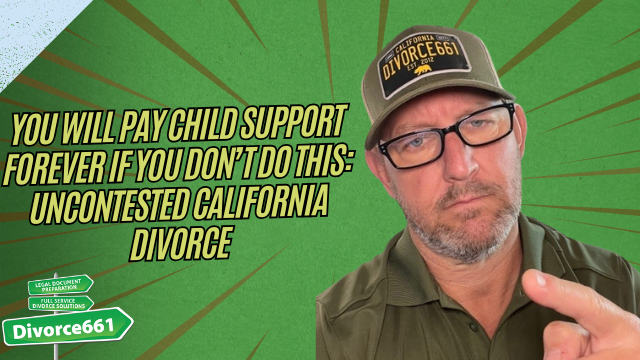You Will Pay Child Support Forever if You Don’t Do This: Uncontested California Divorce
Two people contacted me this week because child support was still being deducted from their paychecks even though their children had been adults for years. The unpleasant reality is this: child support does not stop automatically. If you want the payments to end, you must take steps to terminate the order.
child support will not stop automatically you have to file a termination order so make sure you get that in as soon as possible to stop the child support
Why child support keeps coming out of your paycheck
Court orders and wage assignments remain in effect until they are formally changed or terminated by the court. Employers and payroll departments follow the paperwork on file. That means even after a child reaches adulthood or becomes emancipated, automatic payroll withholding will continue unless there is an official court order that ends the obligation.
Other reasons payments may continue include existing arrears, liens, or an ongoing collection through a state child support agency. Simply assuming the obligation has ended is one of the most common and costly mistakes.
Immediate action plan: Stop unnecessary child support deductions
- Confirm the existing order. Find your case number and court documents so you know exactly what was ordered and who is withholding wages.
- Determine the basis for continued withholding. Is the employer following a child support wage assignment, or is a state child support agency enforcing arrears? Knowing who is collecting helps you target the next step.
- Prepare a termination order or stipulation. If the child support obligation has ended (for example, the child reached the applicable age or is otherwise emancipated), the parties can file a stipulated order to terminate support. In uncontested situations this is usually the quickest route.
- File and obtain a signed court order. Submit the stipulation or petition to the family court and get the judge’s signature. Until the court signs and the order is entered, nothing changes.
- Provide the certified order to payroll and agencies. Deliver a certified copy of the signed termination order to the employer, payroll department, and any child support agency that was enforcing the withholding.
- Check for refunds or credit on arrears. If overpayments occurred while the order should have been terminated, ask about refunds or credits. Rules vary, so get legal or agency guidance.
Common pitfalls to avoid
- Waiting for the court to do it for you. Courts do not automatically modify orders when a child becomes an adult. You must file.
- Assuming employer payroll will act without a court document. Employers require an official order or a notice from the child support agency before stopping wage withholding.
- Overlooking arrears and liens. Even after child support ends, unpaid arrears can continue to be collected until paid or otherwise resolved.
- Not getting certified copies. A judge’s signature alone is not enough — provide certified copies to the parties who are withholding funds.
When to get professional help
If the other parent refuses to sign a stipulation, if you suspect arrears are being enforced, or if the payroll department will not stop deductions even after an order is signed, consult with a family law attorney or reach out to the local child support agency. Many courts also have family law facilitators who can explain the forms and filing process for uncontested matters.
Final note
If child support is still coming out of your paycheck and the child is no longer a minor, act now. File the termination order, get the court to sign it, and deliver certified copies to payroll and any agency involved. Taking these practical steps will stop unwanted deductions and protect your income going forward.



